Turkey Wildcard Region: Key Esports Role and Global Impact
Updated On: October 21, 2025 by Aaron Connolly
Understanding the Wildcard Regions
Wildcard regions cover the smaller competitive areas outside League of Legends’ main leagues. Turkey, Brazil, and Southeast Asia fit into this group. These regions fight for limited slots at international tournaments through special qualification systems.
Definition in League of Legends Esports
In League of Legends esports, wildcard regions don’t have guaranteed spots in major international tournaments. Major regions like North America, Europe, China, and Korea get those direct slots, while wildcard teams must battle through qualifying tournaments.
Riot Games kicked off this system in 2013. They officially put Brazil, Latin America North, Turkey, Oceania, and CIS into the wildcard category. These areas got fewer direct invites to Worlds than the big leagues.
Turkey sits in this group with regions like:
- Brazil (CBLOL)
- Vietnam (VCS)
- Latin America (LLA)
- Oceania (LCO)
Teams from wildcard regions have to go through extra qualification rounds. They play in the play-in stages and hope to reach the main tournament brackets.
Distinction from Major Regions
The main difference? Tournament representation and infrastructure. Major regions get several guaranteed spots at international events. Wildcard regions have to share a few qualifying positions.
Major regions include:
- LEC (Europe)
- LCS (North America)
- LPL (China)
- LCK (Korea)
These leagues usually send 3-4 teams straight to the World Championship group stages. Wildcard regions might send just 1-2 teams, and only through qualifiers.
Infrastructure gaps make things even tougher. Major regions enjoy big sponsorships, franchising, and lots of broadcast coverage.
Turkey’s Turkish Championship League (TCL) works with smaller prize pools and fewer chances for international practice. That’s a real disadvantage, even if the player talent is there.
Emergence and Evolution
Wildcard regions came about because Riot Games wanted to globalise League of Legends esports but still keep things fair. The system’s changed a lot since 2013.
Early years (2013-2015) were rough. Wildcard teams barely won any games at international tournaments. Mineski, for example, finished 0-8 in 2013.
Then in 2014, Brazil’s KaBuM! shocked everyone by beating European powerhouse Alliance. That win proved wildcard regions could actually compete.
Albus NoX Luna from CIS made a splash in 2016 by reaching World Championship quarterfinals. They even beat major region teams and got out of their group.
The play-in system arrived in 2017. It gave wildcard regions a clearer path to big tournaments. Teams now have to get through structured qualifying rounds instead of dropping straight into group stages.
We’ve seen stars like Vietnam’s Levi get noticed and move to major regions. That kind of talent migration helps wildcard regions grow and gives players more career options.
Turkey in the Wildcard Ecosystem
Turkey started out as a wildcard region in League of Legends esports. Over time, the region built up a reputation thanks to consistent international showings and a super passionate fanbase.
Turkey’s Entry as a Wildcard Region
Turkey jumped into League of Legends esports through the wildcard system in 2012. Riot Games grouped Turkey with other up-and-coming regions that didn’t have a guaranteed spot at the big events.
The Turkish Championship League (TCL) became Turkey’s top competition. In the early days, Turkish teams had to play in International Wildcard Tournaments to get a shot at Worlds.
Turkish squads faced tough rivals from Brazil, Latin America, and Japan. Only the very best wildcard teams advanced to play against the majors.
Infrastructure and coaching were pretty limited at first. Most Turkish players balanced gaming with other jobs or school because money was tight.
Unique Identity and Reputation
Turkey carved out a reputation for aggressive play and wild fans. Turkish teams often caught opponents off guard with unexpected strategies and fast-paced matches.
The region became a bit of a factory for talented mid-laners and creative team comps. Turkish crowds at international events brought some of the loudest, most memorable energy in esports.
Key Turkish Strengths:
- Strong mechanics in individual matchups
- Creative drafts and champion picks
- Solid team fighting
- An incredibly dedicated fanbase
Turkish playstyle leaned into early game aggression and lots of skirmishes. Sometimes that threw major region teams off their game, especially in best-of-one matches.
The region kept its unique culture but still adapted to international standards. Turkish orgs poured more into player development and coaching as time went on.
Key Milestones
Turkey hit some big moments that really put it on the map. Those achievements helped the region earn respect from Riot Games and teams worldwide.
2017 was a big year—Turkey got better seeding at international tournaments. Riot took notice as the region kept improving.
By 2018, Turkey landed direct qualification spots to the main events, skipping the old wildcard rounds. That was a huge nod to the region’s growth and strength.
Major Turkish Achievements:
- Multiple Worlds appearances
- Wins over major region teams internationally
- Growing viewership and player base at home
- Building up pro infrastructure to rival bigger regions
The TCL expanded its format and prize money. Turkish teams even started attracting international players and coaches to boost their rosters.
By 2020, Turkey was facing off against Europe, Korea, and China on a regular basis. The region had really outgrown its old wildcard label.
Major Tournaments and Turkey’s Representation
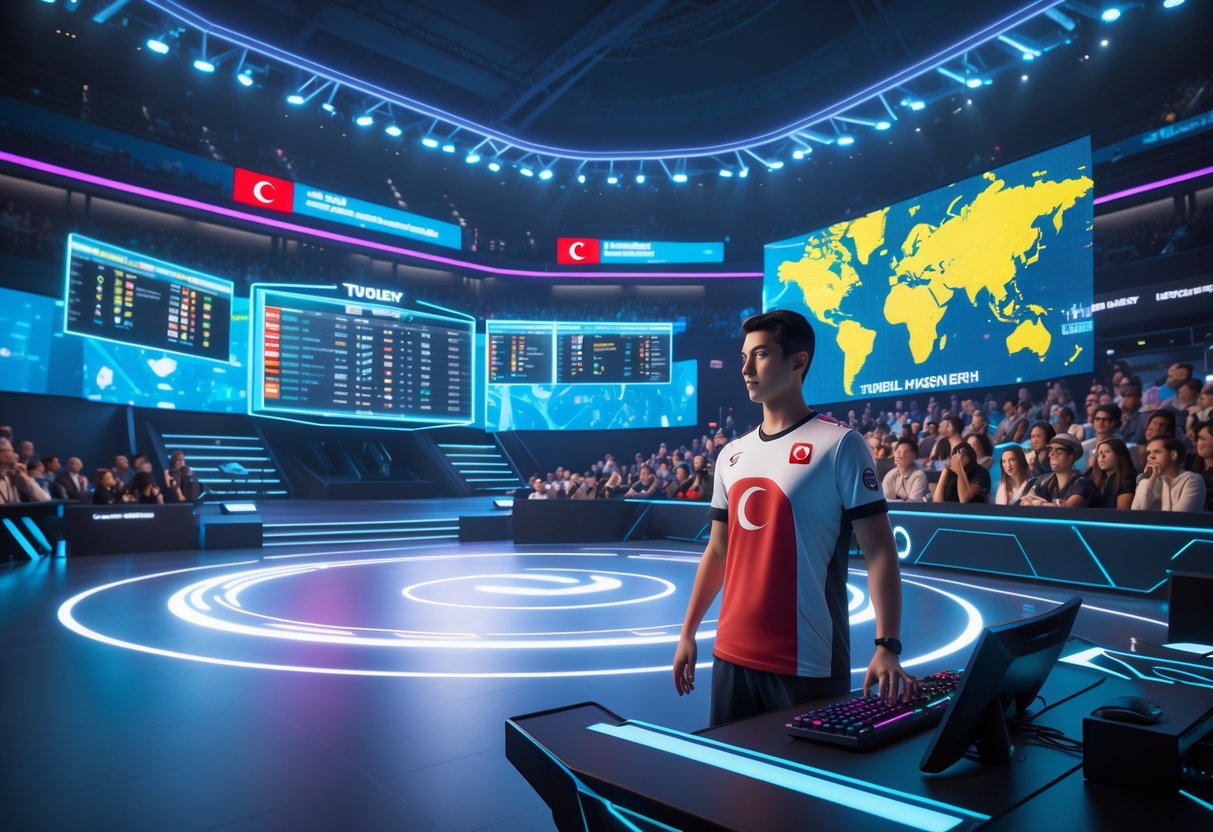
Turkey has sent teams to international League of Legends tournaments since 2014. Squads like Dark Passage, SuperMassive, and Galatasaray have all represented the Turkish Championship League (TCL). The region has had to deal with shorter prep time and less ideal practice conditions compared to the top leagues.
Worlds Participation
Turkish teams have reached the League of Legends World Championship several times since 2014. Dark Passage went first for Turkey at Worlds 2014, joining Brazil’s KaBuM! as a wildcard entry.
SuperMassive Esports became Turkey’s most reliable international team. They made it to several World Championships and helped establish Turkey as a serious wildcard region.
Turkish teams usually start in the Play-In Stage at Worlds. Wildcard regions have to battle each other and third seeds from major leagues for spots in the main event.
Recent Turkish Worlds Representatives:
- 2014: Dark Passage
- 2016-2018: SuperMassive Esports (multiple runs)
- 2019-2022: Various TCL champions
To qualify, Turkish teams need to win the domestic league. Then, they usually have to survive extra wildcard qualifiers.
MSI Appearances
Turkey has appeared at the Mid-Season Invitational via the International Wildcard Invitational (IWCI) system. This tournament decides which wildcard region gets a spot at MSI with the major regions.
SuperMassive played in several IWCI events from 2015-2017. Their head coach Adrian “hatchý” Widera talked about the rough practice conditions in Mexico City during the 2016 IWCI.
Turkey’s MSI Timeline:
- 2015: Only 17 days to prep for IWCI
- 2016: Better scheduling, but still poor practice facilities at first
- 2017-2019: More IWCI appearances
Turkish teams have had a tough time with inconsistent prep periods compared to the big regions. Some years, they got enough practice—other times, not so much.
The IWCI format has changed, but Turkey still fights for MSI spots through regional qualifiers.
Main Event Breakthroughs
Turkey’s biggest breakthrough came thanks to SuperMassive Esports making it past Play-In stages at international tournaments. The team proved Turkish League of Legends could go toe-to-toe with major regions when they got enough prep time.
During their best years (2016-2018), SuperMassive pulled off some wild strategies that caught international teams off guard. Turkish teams built a rep for aggressive early games and surprising champion picks.
Key Achievements:
- First Turkish team to get out of Play-Ins
- Multiple upsets over major region teams
- Cemented Turkey as a top wildcard region in Europe
These main event runs really mattered for Turkish esports. Riot Games put more resources into the Turkish Championship League after these results.
These days, Turkish teams keep building on SuperMassive’s legacy. Teams like Galatasaray and Fenerbahçe have stepped up, bringing in experience from traditional sports to the Turkish League of Legends scene.
Key Rivalries and Bo5 Achievements
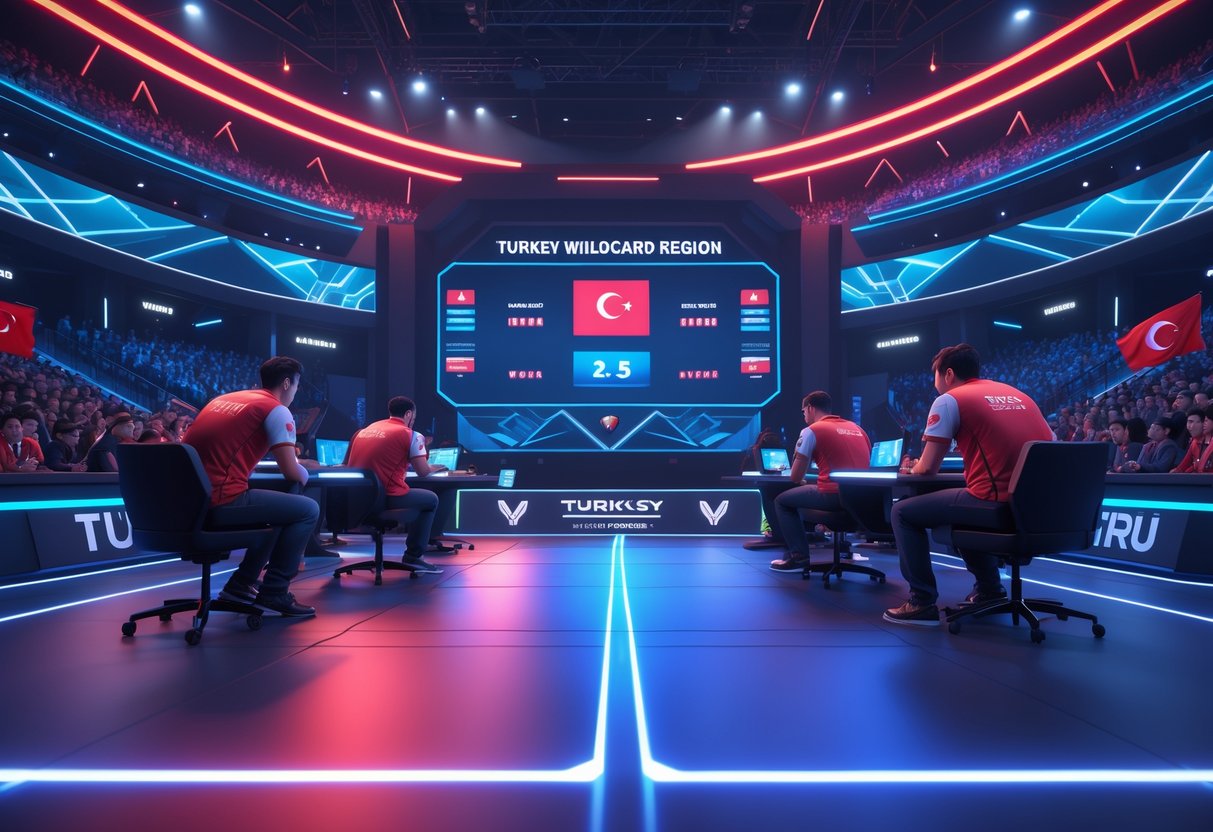
Turkish teams have earned their reputation through tough best-of-five series, both at home and internationally. These long matches really test a team’s tactics and mental game on the world stage.
Historic Bo5 Victories
Turkey’s best Bo5 moments happened during the International Wildcard Tournament era. The Bangkok Titans beat Chiefs Esports Club 3-1 in the 2015 Turkey finals, earning a spot at Worlds.
That series showed Turkey could handle high-pressure situations. The match dragged on for over two hours, but the Titans pulled off better late-game plays.
SuperMassive eSports became Turkey’s Bo5 kings during their prime. They won Turkish Championship League finals in five-game thrillers against rivals like Royal Bandits and Galatasaray Esports.
SuperMassive made a habit of dropping the first game, then bouncing back to win the series 3-1 or 3-2.
Notable Upsets Against Major Regions
Turkish squads have shocked EU teams in Bo5 play-ins. Dark Passage surprised everyone by taking games off big European orgs during Worlds qualifiers.
SuperMassive’s top moment was reaching the main event at MSI 2016. They beat Flash Wolves from the LMS region in a huge Bo5 series to move on from play-ins.
That win took all five games and showed Turkey could play smart, not just fast. SuperMassive’s jungler Stomaged became a local legend after his clutch performance in the last game.
Heads up: Many of these Turkish upsets happened before franchising changed how tournaments work.
Turkish Strength in Play-In Stage
Turkey often shines in Bo5 elimination matches during Worlds play-ins. Teams put in a ton of work to prep for these do-or-die series against other emerging regions.
1907 Fenerbahçe and Galatasaray Esports both won key Bo5s to reach the main event. They beat teams from Brazil, Japan, and other wildcard areas.
Turkish orgs really invest in coaching staff for Bo5 prep. Coaches study opponent drafts and plan out strategies for long series.
Since 2018, Turkey’s win rate in play-in Bo5s sits above 60%. That’s helped make Turkey one of Europe’s strongest up-and-coming regions, right up there with the main EU leagues.
Comparing Turkey with Other Wildcard Regions
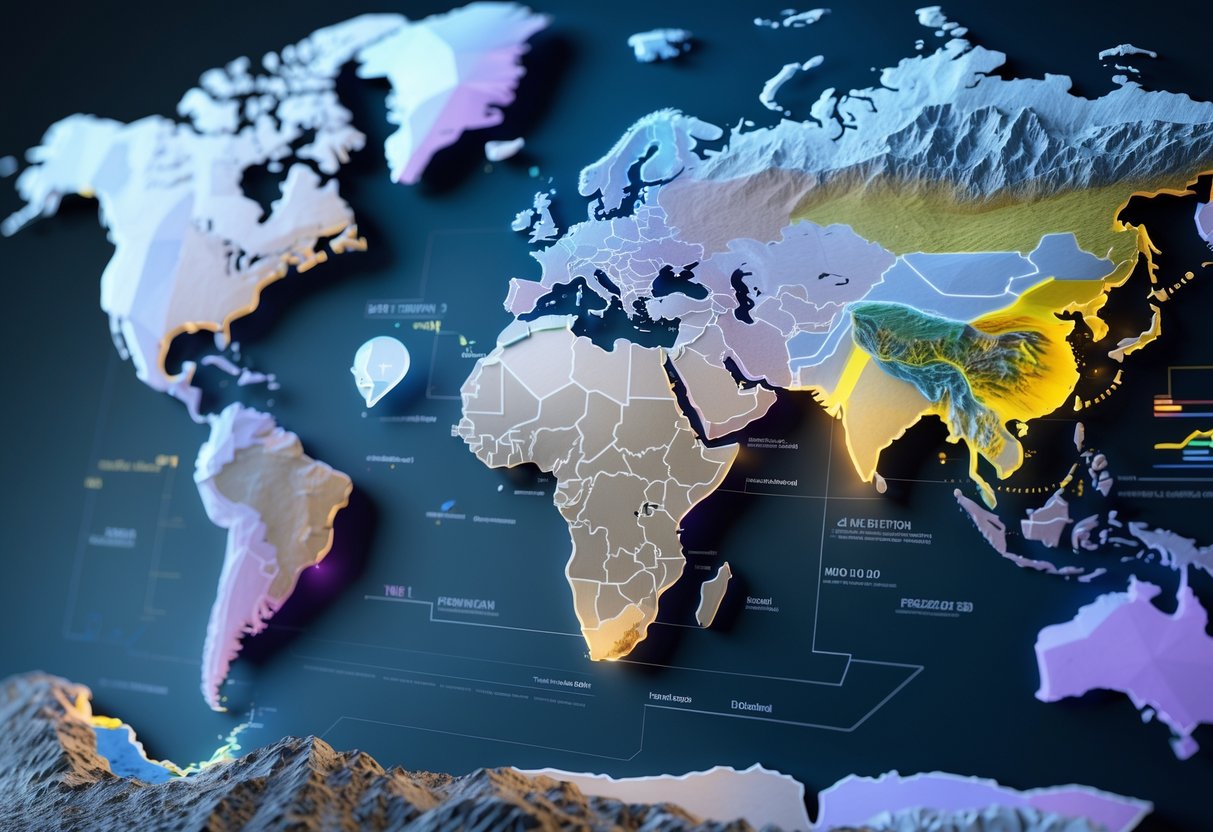
Turkey has kept pace with Brazil at big tournaments, but Vietnam has recently pulled ahead. Turkey stands out for its infrastructure growth, but still wrestles with the same talent retention problems as other wildcard regions.
Performance Against Brazil, Vietnam, CIS
Turkey and Brazil both have two World Championship appearances. That puts them just behind Vietnam, which has three, but still ahead of several other wildcard regions.
Since 2017, Vietnam has really pulled ahead as the strongest wildcard region. Vietnamese teams keep making it to the main events at MSI. Meanwhile, Turkey hasn’t reached a main stage since 2016.
Brazil matches Turkey in Worlds appearances, but Brazil’s KaBuM upset against Alliance in 2014 stands out as a more iconic moment than anything Turkey has managed so far. Both regions struggle when they face major region teams.
The CIS region has mirrored Turkey’s inconsistency. Each region made it to Worlds twice, but neither found lasting success. Unlike Vietnam, neither CIS nor Turkey has managed to dominate their own scenes.
Turkey’s 1907 Fenerbahçe went 0-6 at Worlds 2017. That was a rough showing, especially compared to Brazil, whose teams usually win at least one game per tournament.
Strengths and Weaknesses
Turkey enjoys a real advantage thanks to its geographical proximity to Europe. Turkish teams can scrim with EU squads more easily. Brazil and other wildcards struggle with ping and isolation.
Turkish teams get better infrastructure than most other wildcard regions. The local football culture helps build esports organisations. Vietnam benefits from strong regional support too.
Both Brazil and Turkey have large server populations. That means deeper talent pools compared to smaller places like Oceania or Japan.
Turkey keeps losing top talent to European teams. Players like Frozen leave for bigger opportunities. CIS and Brazil face the same issue with their stars.
Language barriers hit Turkey differently than they do in English-speaking regions. Communicating with international coaches can be trickier for Turkish teams than for, say, Oceania.
Vietnam’s domestic investment outpaces Turkey’s. Vietnamese orgs pay better salaries and offer stronger training setups than most Turkish teams.
Trends in International Play
Turkey’s international results have dropped off since 2016. The region peaked with Dark Passage’s early runs but hasn’t kept up since. Vietnam, on the other hand, keeps getting better.
Play-in formats seem to suit Vietnam more than Turkey. Vietnamese teams adapt quickly to best-of-five elimination matches. Turkish squads often falter under pressure.
Meta adaptation looks different in each region. Turkey usually copies European game plans, while Vietnam invents their own. That creativity gives Vietnam a better shot at upsets.
Brazil and Turkey both lean heavily on star players. If those stars have a bad day, the whole team falls apart. Vietnam spreads its talent more evenly, which helps in tough matches.
Recent events have only widened the gap between major regions and wildcards. Turkey faces the same uphill battle as Brazil and CIS when it comes to closing that skill gap.
Bootcamping makes a big difference. Vietnamese teams invest more time and resources into pre-tournament prep. Turkish orgs lag behind here, and it shows in their results.
Standout Teams and Players from Turkey
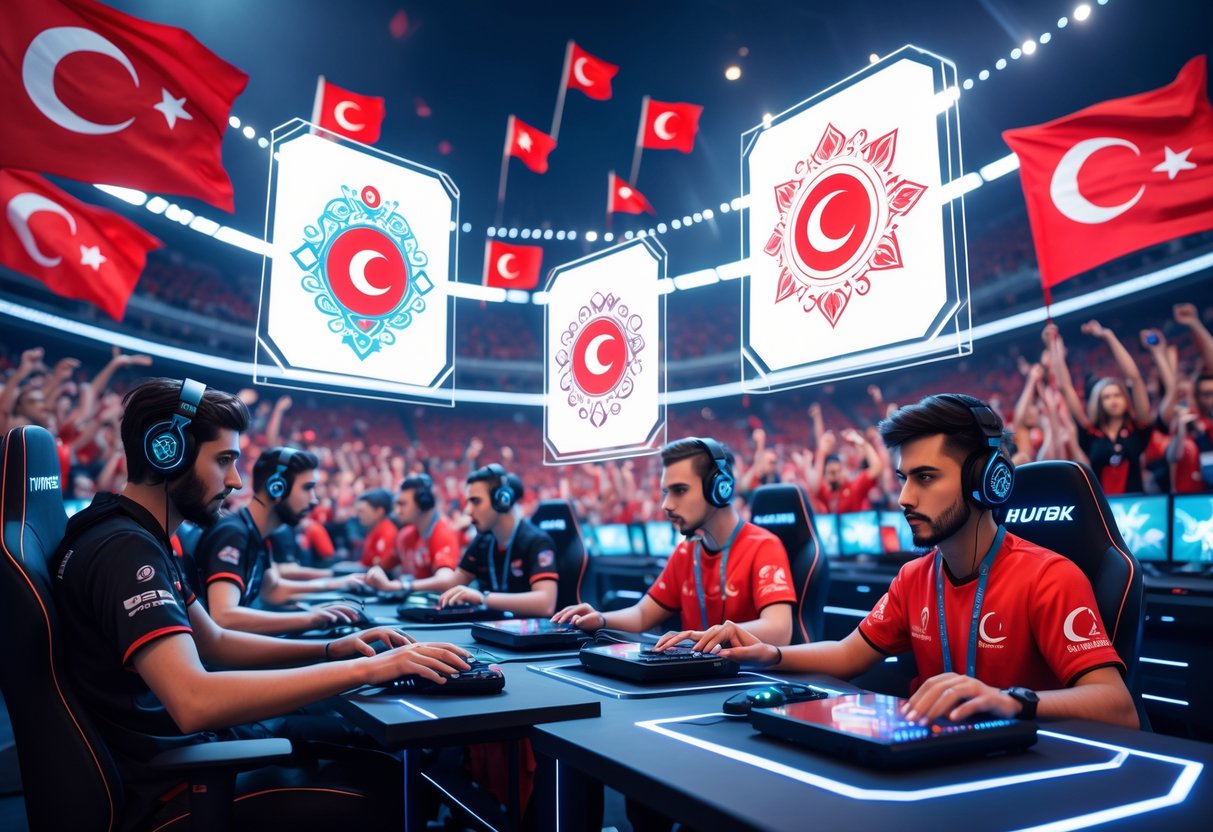
Turkey’s wildcard region keeps producing impressive esports talent and teams. You’ll find established squads with international experience and standout players who’ve left their mark on League of Legends.
Notable Esports Organisations
Istanbul Wildcats have become Turkey’s most successful League of Legends team. They’ve qualified for several international tournaments and usually dominate the Turkish Championship League (TCL).
The Wildcats focus on developing local talent and keeping competitive rosters. Strong management and investment in player development drive their success.
SuperMassive Blaze is another big name in Turkey. They’ve competed at international events like MSI and Worlds.
These teams give Turkish esports much-needed infrastructure. They provide coaching, gaming houses, and salaries so players can go pro.
Smaller orgs like Galakticos and Besiktas Esports also help the scene grow. They nurture up-and-coming talent before those players move to the top teams.
Star Players
Anıl “HolyPhoenix” Işık stands out as Turkey’s most decorated player. The veteran AD carry has more TCL titles than anyone else.
In the 2022 TCL summer split, HolyPhoenix led all AD carries in kills, had the lowest death rate, and boasted the best gold differential at 10 minutes.
His playoff run was wild—just seven deaths in eight games and a 12.4 KDA. Only his teammate out-damaged his 644 per minute.
Tolga “Serin” Ölmez has become Turkey’s top mid-laner. Playing alongside HolyPhoenix, he’s helped Istanbul Wildcats reach international tournaments.
A handful of other Turkish players have earned attention with strong domestic performances. The region keeps churning out talent that can compete with players from major leagues.
Influential Coaches
Turkish coaching staffs put a lot of emphasis on strategy and player growth. Many coaches bring experience from other regions.
Istanbul Wildcats’ coaches have played a huge role in the team’s achievements. Their strategies often hold up well on the international stage.
Coaches in Turkey focus on teamwork and macro play. That’s helped their teams stay competitive, even with smaller player pools.
Many Turkish coaches started out as players before moving into coaching. That background helps them relate to players and communicate better.
The coaching infrastructure keeps getting better as more investment comes in. Now, Turkish teams have multiple coaches, analysts, and support staff to help players reach their peak.
Wildcard Regions at Worlds and MSI
Wildcard regions like Turkey have always faced an uphill battle at the world’s biggest League of Legends tournaments. Only a few have ever made it to the main stage at MSI or Worlds, but Turkey actually pulled it off between 2015 and 2016.
Most Successful Regions
Vietnam tops the list for wildcard success. Vietnamese teams have reached Worlds’ main stage three times and keep qualifying for MSI since 2017.
Turkey broke through in 2015 and 2016. Turkish squads made the main stage at MSI, making them one of just two wildcard regions to do that.
Brazil has also reached the main stage three times at Worlds. They send teams to international events regularly and remain a strong wildcard region.
CIS (Commonwealth of Independent States) managed two main stage runs before the region dissolved. Europe eventually took over their slot because of geopolitical issues.
LATAM, Oceania, and Japan haven’t made it to a main event yet. They’re still fighting through play-ins but haven’t cracked the group stage.
Memorable Moments for Wildcards
The 2017 season really changed things for wildcard regions. That year, major regions started looking closely at wildcard talent, especially after Vietnamese jungler Levi’s breakout.
Levi’s play convinced fans that wildcard regions could produce world-class talent. He showed that individual skill could stand up to the best.
Turkey’s MSI runs in 2015 and 2016 proved wildcards could get beyond play-ins. Those appearances made it clear that with good prep, wildcard teams could challenge the top dogs.
The International Wildcard Invitational (IWCI) set the stage for these regions. Teams fought hard for the single MSI spot up for grabs.
Evolution of Play-In Systems
The play-in format replaced the old wildcard qualifier. Now, more wildcard regions get a shot at big tournaments instead of just one spot.
Current allocation changes from event to event. Worlds gives several wildcard regions play-in spots, while MSI usually has fewer.
Recent changes have shaken up regional representation. Turkey’s TCL might lose its Worlds slot and join the European Regional Leagues system.
The qualifying process lets the best wildcard teams earn main stage spots. Vietnam keeps turning play-in runs into group stage appearances, which shows the system can work if the region’s strong enough.
The League Structure and Tournament Formats

Turkey competes in a system that keeps major regions and wildcards separate. Qualification pathways run through several stages. Seeding rules decide how teams enter international competitions.
Differences Between Major and Wildcard Regions
Major regions—Europe, North America, China, Korea—get automatic slots at international events. They usually have 2-3 direct seeds to Worlds and don’t need to play extra qualifiers.
Wildcard regions like Turkey face tougher requirements. They compete with other emerging regions for just a few spots at big tournaments.
Here’s where things really differ:
- Funding: Major regions get more Riot Games support.
- Tournament slots: Wildcards fight for fewer spots.
- Infrastructure: Pro support varies a lot by region.
Turkey’s Turkish Championship League (TCL) runs year-round with 8-10 teams. Prize pools usually range from £8,000 to £65,000 per split.
Major regions offer bigger prize pools and more broadcast coverage. That leads to development gaps that show up on the international stage.
Qualification Pathways
Turkey has to clear several hurdles to reach international tournaments. Winning the TCL alone doesn’t send a team straight to Worlds.
International Wildcard Championship Tournaments (IWCT) serve as the main gateway. Turkey battles regions like Southeast Asia, Japan, and Oceania for limited spots.
In 2015, IWCT split wildcard regions into two events:
- IWCT Turkey: Southeast Asia, Japan, Turkey, Oceania
- IWCT Chile: Latin America, Brazil, CIS
Winners from each event grabbed a Worlds spot. Since it was double-elimination, Turkey had to beat three other regional champs.
Play-in stages eventually replaced IWCT. Now, Turkish teams enter play-ins against other wildcard champs and lower-seeded major region teams.
Under the current system, Turkish teams must win best-of-five series against international opponents to reach the main tournament bracket.
Seeding and Draw Mechanisms
Turkey usually lands in Pool 3 or Pool 4 seeding at international events. That puts Turkish teams among the lowest seeds.
Draw procedures keep major and wildcard regions apart in group allocations. Turkish teams can’t end up in the same preliminary group as other wildcards.
Here’s how the seeding generally looks:
| Seed Pool | Regions | Turkey’s Position |
|---|---|---|
| Pool 1 | Top major regions | Never |
| Pool 2 | Mid-tier major regions | Rarely |
| Pool 3 | Lower major/top wildcard | Sometimes |
| Pool 4 | Wildcard regions | Usually |
Play-in seeding decides who Turkey faces first. Higher seeds pick their opponents from the lower-seeded teams in best-of-five elimination matches.
Turkish teams have struggled with this system. In 2017, a Turkish team made the Round of 16 at Worlds, so there’s some hope for occasional breakthroughs.
Organisers also consider geography in draws. They try not to group teams from wildly different time zones in the same preliminary stage.
Turkey’s Role in the EMEA Landscape
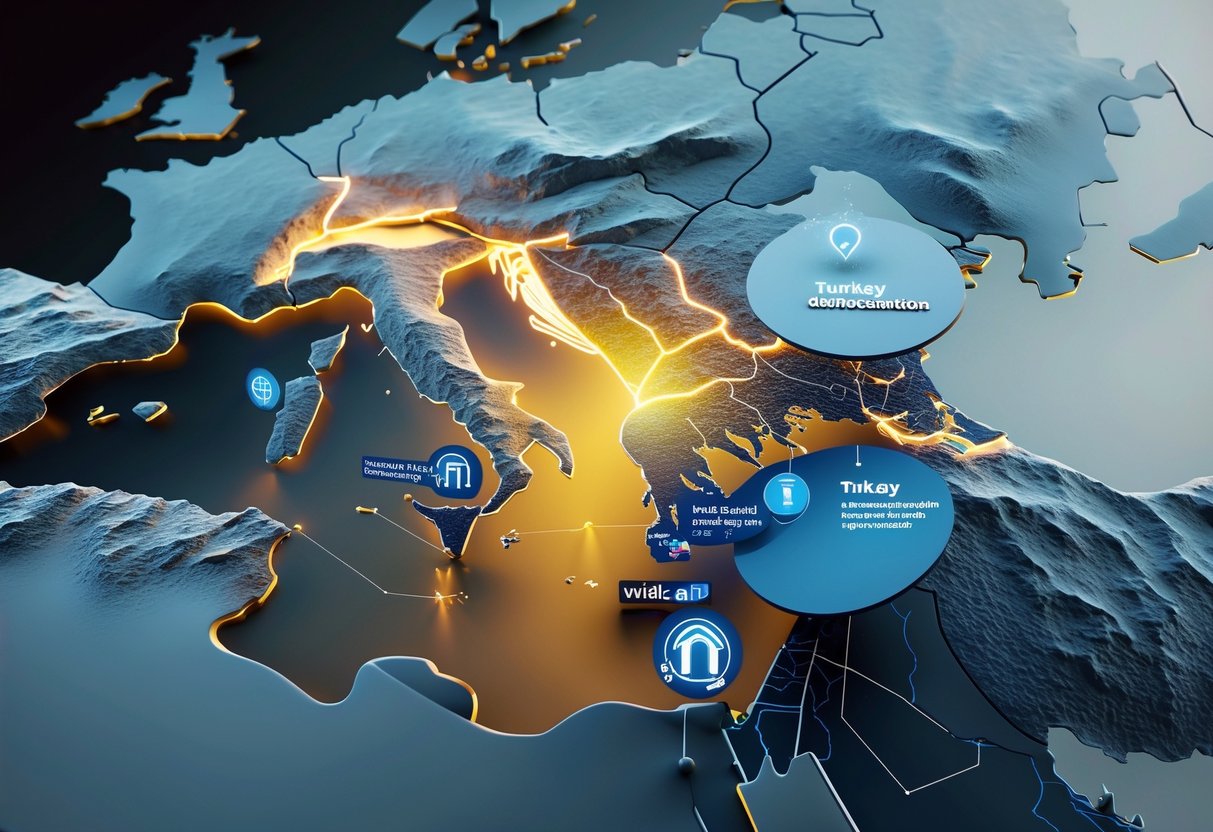
Turkey sits right at the crossroads of Europe, the Middle East, and Asia. That unique spot gives the country a real shot at bridging different competitive gaming markets while growing its own scene.
Regional Integration and Changes
Turkey sits at a crossroads, naturally positioned for EMEA esports growth. The country links European tournament structures with gaming cultures from the Middle East and Asia.
Turkish teams jump into European leagues all the time. This opens doors for talent to move between regions. These days, you’ll spot Turkish players competing all across EMEA.
Key regional connections include:
- Turkish teams join European tournament circuits directly
- They use shared qualifying systems with EU competitions
- Teams and players move between regions
- Joint streaming and broadcast deals happen pretty often
The Turkish government has started backing esports projects lately. They’re putting money into training centers and youth programs. This support boosts Turkey’s standing in the EMEA scene.
Turkish esports organizations often scout players from neighboring regions. That adds some real diversity to the competition. Players from the Caucasus, Balkans, and Middle East can find spots on Turkish teams.
Links with Europe and PCS
Turkey keeps close ties with European esports, especially through the LEC ecosystem. Turkish teams play in regional leagues that feed into Europe’s major competitions.
The Turkey Championship League (TCL) acts as a direct ticket to international events. TCL winners get to play at top European tournaments. This setup is pretty similar to other European regional leagues.
Turkish connections to European esports:
- TCL teams qualify for European Masters
- Turkish players join LEC rosters
- Broadcasts get shared with Riot Games Europe
- Tournament formats and rules mostly match up
PCS (Pacific Championship Series) links are still limited, but they’re growing. Some Turkish players have moved to Pacific regions for new chances. The time zone gap makes regular matches tough, though.
Turkish organizations pour resources into European talent development. They run academies that prep players for European standards. This helps build a steady flow of skilled talent ready for the international stage.
Impact on EMEA Esports
Turkey’s influence on EMEA esports goes way beyond just sending players. The country’s massive gaming population brings big viewership numbers to regional tournaments.
Turkish viewership data shows:
- Fans tune in heavily to European tournaments
- Local broadcasts pull in strong numbers
- Mobile esports keeps growing fast
- There’s more investment in gaming infrastructure
Turkish esports organizations bring financial stability to EMEA competitions. Major Turkish companies sponsor teams across several regions. This funding keeps competition standards high throughout EMEA.
The Turkish gaming market pushes innovation in EMEA esports. Mobile gaming is huge in Turkey, and that’s changing how tournaments get organized. Other regions are starting to adapt to these formats.
Turkish streaming platforms challenge the big European services. Viewers benefit from better features and lower costs. It’s also good news for content creators across EMEA.
Influence on the Global Esports Scene
Turkey’s shaped international competitive gaming in ways that go way beyond its old “wildcard” label. Turkish teams keep showing they can go toe-to-toe with top-tier squads from powerhouse regions. The country’s impact runs from big tournament runs to helping grow communities across different games.
International Recognition
Turkish esports teams have earned genuine respect worldwide with their international results. SuperMassive Games made headlines as the first wildcard team to take down a major region at the League of Legends World Championship in 2016.
That win changed how other regions viewed wildcard teams. Now, Turkish squads qualify for big international tournaments in several games.
Galatasaray Esports and Beşiktaş Esports brought traditional football clubs into the esports spotlight. These partnerships helped make esports a mainstream thing in Turkey.
The Turkish national team has even won medals at international esports events. That kind of success proves smaller regions can stand up to giants like South Korea and China.
Recent highlights include:
- Multiple League of Legends World Championship runs
- Strong showings at Valorant Champions events
- Regional championship wins in several games
Contribution to League of Legends Growth
Turkey’s Turkish Championship League (TCL) has become a tough wildcard region in League of Legends. The league keeps producing teams that can challenge the big names at international events.
We’ve watched Turkish squads make it out of play-ins at Worlds more than once. 1907 Fenerbahçe Esports even reached the main event group stage, showing wildcard regions can’t be ignored.
The region helped push for more wildcard spots at major tournaments. Riot Games expanded those slots partly because of Turkey’s strong showings.
Turkish players have also made their mark in bigger leagues:
- Zeitnot played in European leagues
- Caps (he’s Danish, but his early scene links run through Turkey)
- Dumbledoge competed in multiple regions
The TCL’s production quality and viewer numbers sometimes rival the major leagues. That success nudged Riot to invest more in other up-and-coming regions.
Media and Community Engagement
Turkish esports content creators have started to get noticed globally, thanks to talented casters and analysts. The region puts out English-language content that reaches fans everywhere during international events.
Turkish streaming personalities pull in viewers from Europe and the Middle East. Their ability to switch languages helps break down barriers in competitive gaming.
Fans in Turkey bring a ton of energy to tournaments. You’ll see Turkish supporters traveling abroad to cheer for their teams, making events more exciting for everyone.
Turkish esports social media often trends worldwide during big tournaments. That kind of buzz introduces new fans to the scene.
Turkish organizations have landed partnerships with international brands and sponsors. These deals show wildcard regions can be commercially valuable for global investors.
The region’s progress has encouraged other emerging markets to build up their own esports infrastructure.
Wildcards in Other Esports Titles
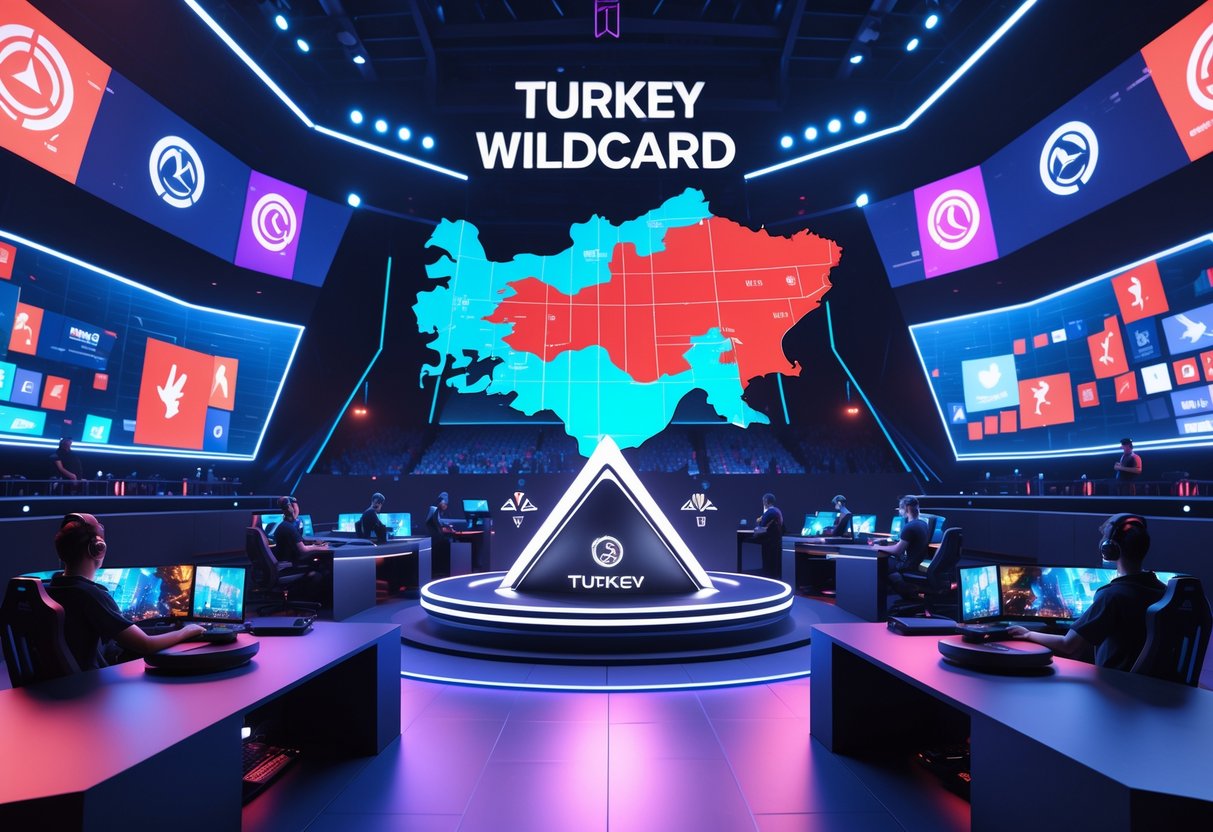
Wildcard regions aren’t just a League of Legends thing—they show up in other major esports, too. Turkey competes in several wildcard formats, from mobile gaming events to regional qualifiers in various games.
Honour of Kings Open Series
The Honour of Kings World Championship is one of the world’s biggest mobile esports events. Turkey plays as part of the International Wildcard region with other emerging markets.
Turkish teams face similar obstacles here as in League of Legends. They have to fight through regional qualifiers before making it to the world stage. The mobile gaming scene in Turkey is booming, and local players have started to make a name for themselves.
Key differences from PC esports:
- Mobile games are easier to access for most people
- Players tend to be younger
- Prize pools and sponsorships keep growing
- The skills and gameplay are a bit different
The Turkish Esports Federation supports mobile gaming projects. That kind of official backing helps make mobile esports a legit part of Turkey’s overall scene.
Role in Global Esports Ecosystem
Wildcard regions help new talent and markets break into the global scene. They give players a shot who might never get noticed otherwise.
These regions bring in viewers from places that usually go under the radar. Turkish fans often stay engaged during international tournaments, even if their teams don’t make a deep run.
Economic impact includes:
- Local sponsorship deals
- Revenue from regional tournaments
- Investment in player development
- Broadcasting rights in local languages
We’ve noticed wildcard teams often try creative strategies. They’ll pull out unusual tactics against favorites, sometimes causing upsets that get everyone talking.
The whole ecosystem benefits from having teams from all over the world. Seeing squads from Turkey, Brazil, Japan, and more makes esports feel truly global—not just stuck in the same old markets.
Comparative Analysis
Turkish wildcard performance changes a lot depending on the game. In some titles, they’re right up there with the best; in others, not so much.
Performance by title:
- League of Legends: Sometimes makes it to group stages
- Valorant: Strong regionally, but not as much internationally
- Counter-Strike: Historically better than most wildcard regions
- Mobile games: Still finding their footing
Turkey has some advantages over other wildcard regions. The government recognizes esports, and there are real facilities for players. Turkey officially recognized esports as a sport back in 2011, which gives legal and regulatory support.
But there are still hurdles. Turkish teams don’t get much practice against top-tier international squads. Travel costs and visa issues can also mess with their prep for big tournaments.
The region usually does best in games where individual skill matters more than complex team play. Turkish players tend to have strong fundamentals but could use more experience working in tight team systems.
Future Prospects for Turkey as a Wildcard Region

Turkey’s future as a wildcard region in esports looks pretty bright. Its spot between Europe and Asia gives it a unique edge. There’s room to grow local talent, upgrade infrastructure, and maybe even become a major esports hub down the line.
Talent Development and Infrastructure
Turkey’s gaming community keeps growing, with more young players jumping into competitive gaming every year. Turkish players are starting to show up at international tournaments in more and more games.
The government has begun treating esports as a real sport. That opens up new training programs and funding. Universities are starting to offer esports courses and even scholarships.
Internet quality is getting better across Turkey. More cities now have gaming centers and fast internet cafés. This helps aspiring pros train without needing fancy setups at home.
Key development areas include:
- Coaching programs through sports federations
- University partnerships with international esports groups
- Investment in gaming venues and practice spaces
- Support for grassroots tournaments and local leagues
Opportunities for Growth
Turkey’s huge population of young gamers gives it a solid base for esports expansion. Its location between Europe and Asia makes it a great spot for international events, too.
Local sponsors are starting to get interested as they see esports’ potential. We’re seeing gaming orgs team up with traditional sports clubs, which brings in established infrastructure.
Mobile gaming is massive in Turkey. That means mobile esports could really take off, with Turkish teams focusing on those competitions.
Growth opportunities include:
- Hosting big international tournaments
- Building regional leagues that connect to global events
- Creating Turkish-language content for local fans
- Forming partnerships with Middle Eastern and European orgs
Potential Path to Major Region Status
Turkey needs to keep performing well internationally if it wants major region status. Turkish teams are already making appearances at global events in different games.
Building strong domestic leagues is key. These leagues need to attract attention and investment from outside. Regular broadcasts and solid production help put Turkish talent in the global spotlight.
Partnering with established major regions could speed up Turkey’s progress. Exchange programs with European or Asian leagues give players valuable experience. Turkish players learning from international coaches can raise everyone’s game.
Requirements for major region status:
- Multiple teams making it to playoffs at international tournaments
- Home leagues with pro-level broadcasting
- Consistent investment from big esports organizations
- Recognition from game publishers as a competitive region
Getting there will take patience and steady investment in both players and infrastructure.
Frequently Asked Questions
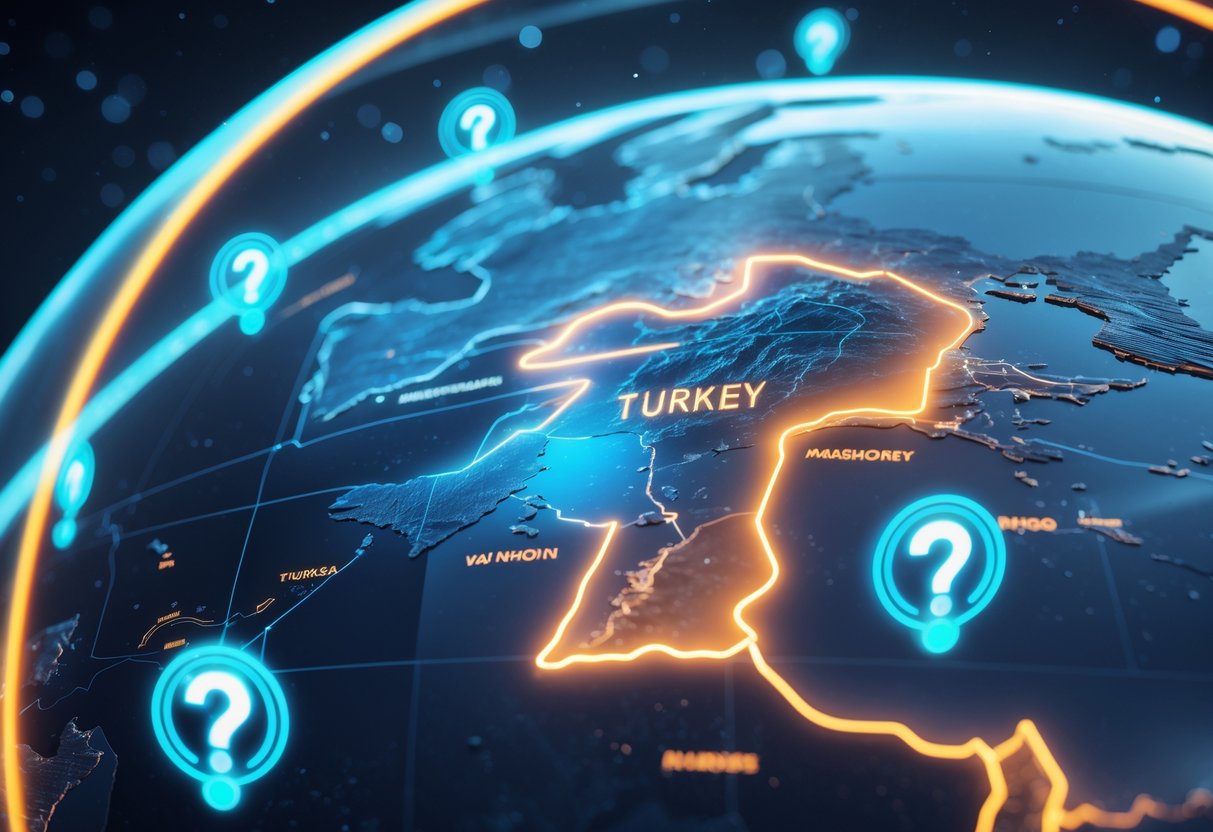
Turkey’s status as a wildcard region in esports sparks a bunch of questions about culture, travel, local food, transport, regional festivals, and where to stay. These practical details help visitors get the most out of Turkey’s diverse landscapes and gaming communities.
What are the unique cultural experiences to enjoy in Turkey’s lesser-known regions?
Turkey’s eastern regions offer up experiences you won’t find in the usual tourist spots. In Kars, check out the ancient city of Ani—it’s got medieval ruins with views across to Armenia.
The Black Sea coast is all about tea culture in Rize. Locals often invite guests to share çay and swap stories about the area’s history.
Central Anatolia’s Cappadocia has underground cities that go beyond the famous balloon rides. Places like Derinkuyu and Kaymaklı give you a peek into Byzantine-era life.
In southeastern Turkey, Mardin stands out with its Mesopotamian architecture. The old city’s stone houses and narrow streets show off centuries of mixed heritage.
How can travellers ensure responsible tourism in Turkey’s hidden gems?
Pick family-run guesthouses instead of big international chains. When you do this, your money goes straight into the local community.
If you visit religious sites, remember to dress modestly. Cover your shoulders and knees, especially in mosques or older neighborhoods.
Try to learn a few Turkish phrases before you arrive. Even just saying “Merhaba” (hello) or “Teşekkürler” (thank you) can go a long way and shows you care.
Buy handicrafts straight from the artisans, not just from touristy shops. That way, makers get fair prices and you get something truly authentic.
Could you recommend local delicacies travellers shouldn’t miss while exploring Turkey’s diverse regions?
Every region in Turkey offers something different, and honestly, the food alone is worth the trip. In the Black Sea area, people cook hamsi (anchovies) in all sorts of creative ways.
Over in the east, Erzurum serves up cağ kebabı—lamb roasted on a horizontal spit. It’s nothing like the döner kebab you might know.
If you end up in Gaziantep, try the pistachios and baklava. Local pastry shops usually keep family recipes alive, and you can taste the tradition.
Van is famous for its honey and cheese. Van otlu peyniri (herbed cheese) with wildflower honey? It’s a combo you shouldn’t skip.
What tips do you have for navigating the local transport in Turkey’s off-the-beaten path locations?
In rural areas, hop on a dolmuş (shared minibus). These little vans run flexible routes and will stop almost anywhere if you ask.
Before heading to remote spots, download offline maps. Trust me, mobile signal can disappear fast in the mountains.
Learn how to read your destination in Turkish script. Most rural signs skip the Latin alphabet, which can throw you off.
Bring cash for fares. Outside the big cities, local transport usually won’t take cards.
Are there yearly festivals or events specific to Turkey’s various regions that visitors should be aware of?
Every January, Selçuk hosts the Camel Wrestling Festival. This Aegean tradition pulls in crowds from all over Turkey.
Edirne comes alive in June with the Kırkpınar Oil Wrestling event. It’s actually one of the oldest sports competitions in the world.
If you’re in Cappadocia in September, check out the Avanos International Arts Festival. Pottery workshops open up for everyone to watch and join in.
Artvin celebrates the Kafkasör Culture and Arts Festival every July. Expect traditional music, dance, and a real taste of Black Sea highland culture.
What kind of accommodation options are available when venturing into the more unexplored areas of Turkey?
You’ll find mountain pensions (pansiyon) with basic rooms and shared facilities. They usually charge about £15-25 per night, and breakfast is thrown in.
Cappadocia’s cave hotels cover everything from budget to high-end, honestly. If you just want the experience, you can get an authentic cave room for around £30 a night.
Along the Black Sea coast, a handful of places actually offer treehouse stays. These eco-friendly spots run about £40-60 per night, and the forest views are pretty hard to beat.
Thermal hotels near the hot springs let you soak and relax. In Pamukkale or Afyon, you’ll see packages starting at £50 a night, spa access included.


